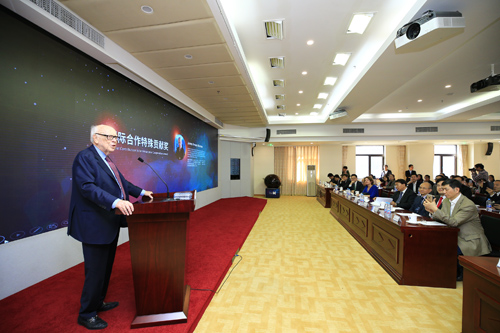


James Watson, winner of the Special Contribution Award for International Cooperation in Biosciences and Medicine, speaks at the award ceremony. [Photo/ cas.cn]
Chinese Academy of Sciences (CAS) President Bai Chunli met with James Watson, co-discoverer of the DNA double helix structure, co-winner of the Nobel Prize in Physiology or Medicine, and member of the US National Academy of Sciences, and awarded him the Special Contribution Award for International Cooperation in Biosciences and Medicine in Beijing on March 31.
At the award ceremony Bai said Watson’s visit to China is a new starting point to continue his cooperation with the Chinese science community, and offers an opportunity for the US Cold Spring Harbor Laboratory to conduct academic exchanges and research cooperation with CAS and other high-level Chinese academic and research institutions.
Bai expressed the hope that all parties will work together to achieve more in life sciences and make new breakthroughs in promoting innovation and industrialization of research findings in this field, as a contribution to human civilization and people’s well-being.
Watson said that he was so glad to receive the award, and looked forward to working with Chinese scientists in cancer research. He hoped to have more opportunities to come to China for extensive exchanges and cooperation with Chinese researchers in future.
Watson jokingly described his scientific life as conducting experiments, writing articles, attending meetings, writing books and traveling across the world. According to him, a broad knowledge base helped him a lot in scientific research, which in turn enabled him to form deep friendships with many top scientists. In his opinion, attending meetings and writing articles was also important for deepening his research. Although retired, he remains willing to attend various meetings, get to know new people and make new friends in different places, and to help young people in their research in biology.
China has a large population with many talented people, while sciences know no borders and need global talents to work together, so he hopes to carry out further exchanges and cooperation with more Chinese scientists in future, Watson said.
Bai and Watson also attended a launching ceremony for the “2nd VCANBIO Award for Biosciences and Medicine”.
VCANBIO Award for Biosciences and Medicine, a top award in life sciences and medicine in China, was co-launched in 2016 by the University of Chinese Academy of Sciences, the VCANBIO Cell & Gene Engineering Corporation, and the VCANBIO Biotherapy Foundation in Shenzhen. It aims to honor outstanding Chinese and foreign scientists who have made breakthroughs in medicine as well as innovative talents with great potential, and thus contribute to the industrialization and development of life sciences in China and the rest of the world.
Source: cas.cn